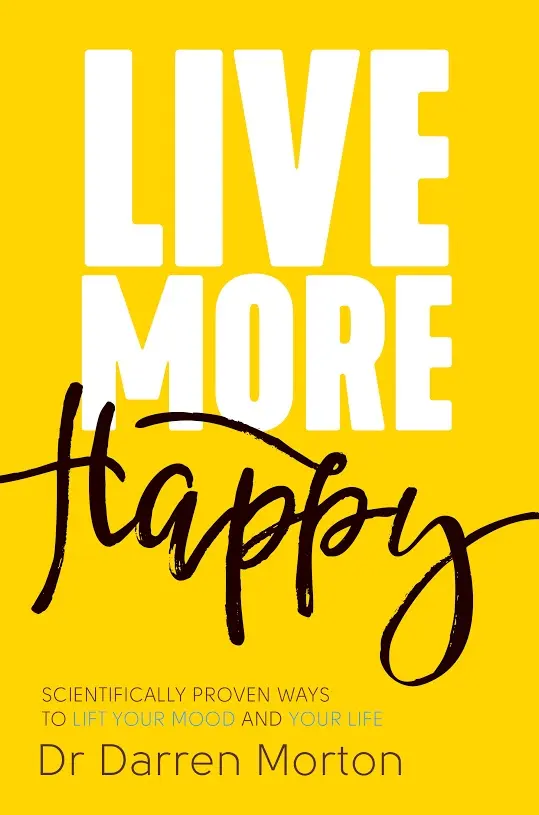Back
Dr Darren Morton the author of Live More: Happy. Scientifically Proven Ways to Lift Your Mood and Your Life.
We wish each other “Happy birthday” and “Happy new year!”—and don’t forget to wish that special someone “Happy anniversary” on that special date. Yet we never stop to consider what we mean when we wish each other happiness and what might be the real goal of “the pursuit of happiness” as the United States’ Declaration of Independence so famously expressed it.
Let’s start with definitions. The word “happy” for some people conjures fluffy fleeting feelings. But “happy” has depth to it and is a topic of increasing scientific study. Happiness researchers prefer to use the term “subjective personal wellbeing” but as this sits awkwardly on greeting cards and book covers, I prefer to talk about being “happy”.
One thing is for sure, we all desire to be happy. As Anne Frank once wrote, “We all live with the objective of being happy; our lives are all different and yet the same”. So what does it mean to be happy?

The science says that to live a truly happy life, also referred to in Positive Psychology arenas as a life that “flourishes”, there are five essential ingredients: positive emotions (this is where the good feelings come in), enjoying good things that engage our interest, experiencing a sense of achievement in the things we do, being surrounded by positive relationships, and having a sense of meaning in our life (derived from having a sense that we belong to and serve something bigger than ourself).
There are some surprising things about happiness. The first is that is it less dependent on our circumstances than most people would assume, with studies suggesting that the total of things like our wealth, where we live, and how attractive we might be only contributing about 10 per cent to our enduring happiness. Obviously a bad thing can ruin our day, but our long-term happiness in less circumstantial. Approximately 50 per cent of happiness is attributed to personality and genetic inheritance—some people are naturally cheerier. But if that doesn’t describe you, don’t dismay as estimates suggest that 40 per cent of our enduring happiness is result of our daily habits, choices and attitudes. We get to choose about half of our happiness.
These means we need to start making better choices for happiness. In Australia—one of the ten happiest countries in the world, according to the World Happiness Report released last week—one in ten adults takes an antidepressant each day. Medications have a role to play, but we are not throwing everything at this epidemic of low mood. Over the past couple of decades, a number of evidence-based strategies for improving mental health and emotional wellbeing have arisen from the fields of lifestyle medicine and positive psychology. What’s more, the side effects of these strategies are all good.
Simple things like eating more fruits and vegetables, going for a walk, spending time in nature, reflecting on what went well and what we are grateful for, prioritising adequate sleep, and performing intentional acts of kindness have all been shown to be significant mood lifters. It is puzzling why these happiness prescriptions are not regarded as more integral components of health care.
There are good reasons to be happy, apart from the obvious fact that life is better and more fun when we are. Not only are happier people mentally healthier, they also tend to enjoy better physical health because how you feel affects how you heal. Because of this happier people even tend to live longer!
As happiness is a worthy goal, it is a good thing that the southern Asian kingdom of Bhutan led the way for the United Nations to inaugurate the International Day of Happiness in 2012. This small mountain nation shifted its focus from Gross National Product to Gross National Happiness as a measure of social wellbeing in the early 1970s and has invited us to give greater consideration to happiness and wellbeing “as universal goals and aspirations in the lives of human beings around the world.” Such recognition might cause us to re-evaluate how we measure social progress, beyond the merely economic.
So may your day be a happy one. And to ensure it is, here is a golden tip that happiness scientists keep coming back to as one of the most effective ways to give yourself a lift: make someone else happy. Try it for yourself today.

Image: Dom Cherry

